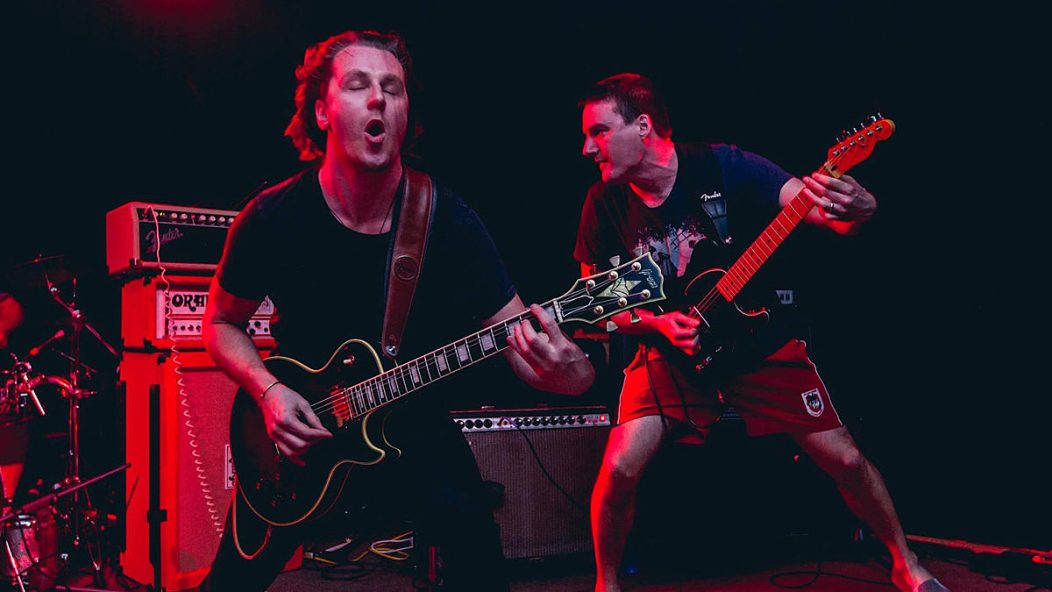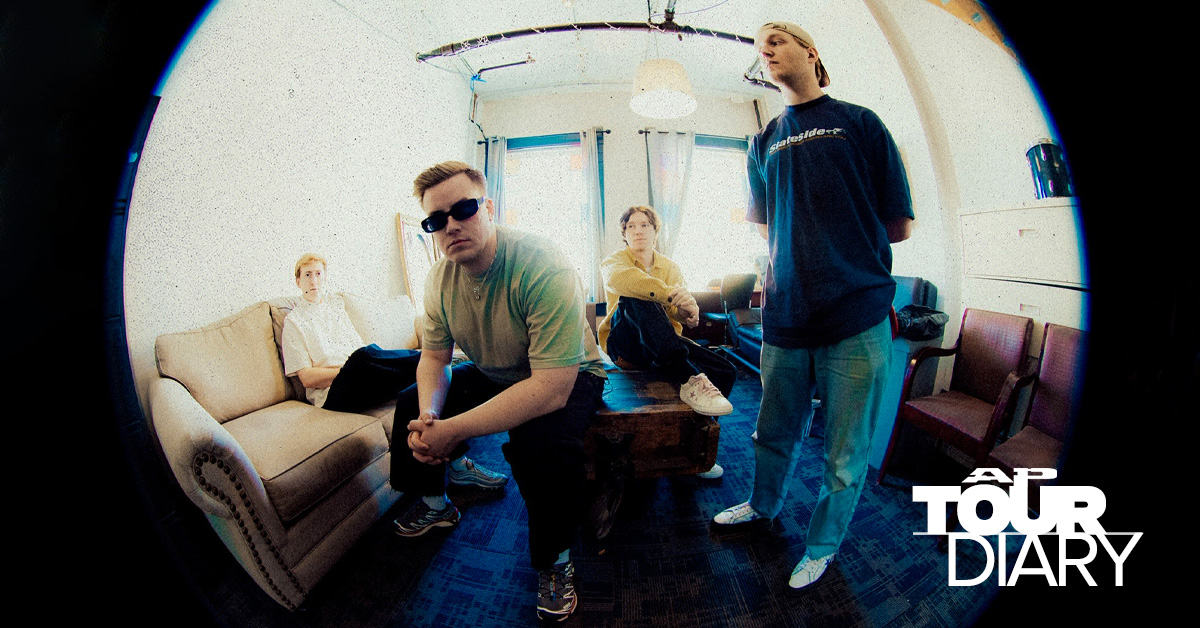
The Listening Party: Lachlan Dale

…
The Listening Party aims to connect songwriters to their influences and speak to the inspired fan in us all. After an interview discussing songwriting methods, I choose music for artists to deliberate, and in turn they provide songs that have impacted their craft. In a perfect world, this would occur with libations and prolonged discussion. Improvise at your own will.
Lachlan Dale runs the eclectic Art As Catharsis record label, releasing some of the best underground music in Australia and New Zealand. He also shreds in Serious Beak and Hashshashin, two bands who have greatly tickled my sensibilities.
What are some of your earliest and/or biggest musical influences and how do they factor in your songwriting? How have you developed as a guitarist and songwriter over time?
Neurosis were formative to me ten, fifteen years ago. They introduced me to the idea of using music to purge, or as a cathartic practice. In the years that followed I slowly began to understand their ideas around ritual and personal myth. They’re a band that I’ve grown with.
My friends and bandmates in Serious Beak greatly increased my conception of what was possible in music. We spent a decade playing together. In the beginning I could barely play guitar. Through their patience and generosity I gradually became a musician. We spend countless hours absorbing, discussing and dissecting music — bands like Secret Chiefs 3, Estradasphere, and Sleepytime Gorilla Museum. I don’t know where I would be without them.
Over time, who can say how they’ve improved? I suppose at some point I began to feel like my brain was finally connected properly to my hands, and that I could express myself to a reasonable degree with a guitar. These days I have a lot of abstract associations when I play. Learning music is like learning a strange, alien language.
Serious Beak tracks feel like they could continue forever, with you guys generating riff after riff. At what point do you decide a song is finished? Are there a collection of riffs that you work into a composition or do you compose after a central theme has been developed?
We talk composition in great detail. It can mean the writing process is long, uncertain and potentially open-ended. A lot of energy is spent trying to establishing a sort of overall thematic balance.
Our songs generally start with a handful of themes or ideas that are developed in creative bursts. The guys were always driven by trying to do something new — whether a technical feat, or to bring in another influence into songwriting. This sort of process was fascinating to me, and I soaked it up. I wasn’t a primary composer.
In what ways were you challenged as a songwriter composing for Hashshashin?
In Hashshashin it wasn’t long before my approach of bringing near-complete, structured songs to the band proved insufficient. It didn’t offer enough freedom for Evan and Cam, who are both incredible musicians.
Lately we’ve been using an intense and highly collaborative writing process. I suppose it reminds me of the old Serious Beak days — the constant writing, cutting and revising. Sometimes that process feels endless.
More recently I’ve been trying to absorb non-Western music — classical Persian, Hindustani, Pakistani, and Afghan music in particular. The basis of these traditions are completely foreign to me, so we’re patiently taking the time to try and develop the knowledge necessary to move in this new direction.
We’re also experimenting with writing music in a purely unamplified setting. On a recent trip to Tajikistan, I was struck by the trance-inducing performances of local sufi musicians. We are trying to move some of these concepts into new Hashshashin material.
How has your environment shaped your musical identity?
The idea of drone and ritual trance music is very important to me. Perhaps I’m attracted to this due to a sense of absence in our culture. I can’t help but feel that we’ve lost something essential in our embrace of scientific rationalism and consumer capitalism.
Australia is a strange and isolated place. We are one of the most sparsely populated countries in the world, and we have a warped, rootless sense of history. Maybe that’s why I’m captivated by indigenous cultures in Tibet, India, Afghanistan, and here in Australia.
We have dreamt a strange vision of life on this empty continent. At times it can feel so limited as to be suffocating. I know plenty of good musicians who have had to flee, and are happier for it. I also know others who have taken the strange Australian psyche and crafted excellent art — Drowning Horse come to mind.
Art and music have boundaries that are far more liquid than the dominant national cultural identity. Maybe my interests are varied because our history is so narrow.
As a writer, what role does literature play in your songwriting?
This is an excellent and difficult question.
Good writing expands your mind. It opens up paths of thought that would otherwise be inaccessible. When you consider how fundamentally our minds both colour and mediate our experience of the world, I think this is particularly profound.
In many ways I see my interest in Tibetan Buddhism, in philosophy and in anthropology as part of the same impulse as my interest in music. All these pursuits aim towards the transcendence of the self; towards growth and development. They all hope to facilitate a slow awakening.
…
Aaron’s Picks
Pyrrhon — “The Happy Man’s Creed”
I really liked how this opened – that sort of switch between chaos, drones, and noise – but I was a little disappointed when the song seemed to settle into relatively straight up death metal. The introduction had me hoping for something a little more experimental.
Despite the shredding this just seem to fall back on safe, conservative death metal tropes. It reminds me of Cryptopsy, and ever so slightly of early Cephalic Carnage. It makes me want to listen to Ulcerate for a superior execution, or maybe Lucid Intervals.
Full disclosure: I really burnt myself on death metal and grindcore a decade ago. I feel like there is potential in technical death metal, but I’m always surprised how most bands manage to make such an extreme style so pedestrian. I think this usually comes down to lack of dynamics and variance: if you play nothing but blast beats shred for a whole song, then it will never have any impact. The extremity becomes meaningless without a counterpoint.
…
Estradasphere — “Smuggled Mutation”
These guys are a formative band for me. They really helped me to stretch my concepts of what music “can” or “should” be. Palace Of Music isn’t one of my favorites, but it still gets regular play.
I do enjoy the outlandish blasts. It’s something they’ve always done well — sliding from Jewish traditional music into extreme metal as though it’s a perfectly reasonable thing to do. The drum kit sounds excellent.
Compare this to the Pyrrhon track: how does it feel when the blast beats kick in at 3:13? It has impact (and meaning) because the song has dynamic range.
…
Yowie — “The reason your house is haunted can be found on this microfiche”
Well this is pretty bizarre and discordant… I like it. It’s certainly more interesting than most of what passes for math rock — all that major key noodling and safe time signatures… bleh.
There are some cool sections and ideas in here, but overall the composition leaves something to be desired. There are parts which just seem to plod along with no dynamic movement. One of the main themes remind me of Sydney locals Instrumental (adj.) — who I think kick their ass.
That sped-up section from 5:30 is pretty excellent — and that last riff too. These guys are unique. I’ll definitely check out some more of their recorded material.
…
Lachlan’s picks
I’ve been finding it difficult to discover new music to inspire me.
After recently spending a month in Central Asia (and four months in Nepal and India last year) I’ve turned increasingly to what we dismissively call ‘world music’.
So, here are my picks:
…
Ustad Zia Mohiuddin Dagar — “Raga Yaman: Alap”
I’ve been conceptualising music in a similar way to how Hannah Gadsby speaks about comedy.
In her excellent and final show, Nannette, Hannah says that the role of a good comedian is to build a level of tension in the audience, and then release it through a joke. In her case, she uses trauma from her past — say, a story about a time where she was physically threatened for being gay — to generate tension, and then deflates it with a quip or a punchline.
She’s come to a point in her life where she believes that comedy’s focus on tension and release has inhibited her psychological growth. She believes there is a third and final stage — resolution — which is unattainable in her chosen medium, and so she is walking away from comedy to heal and evolve.
Now, I certainly have not experience anything like the trauma that Hannah Gadsby has. I am a profoundly lucky and privileged individual, but I do follow a similar process with my composition. I attempt to channel negative emotional states into musical themes, which the band then tries to manipulate in a clever way, all the while building up to some sort of cathartic release. This is how post-rock operates.
But lately I’ve been wondering whether this is too narrow a conception of music. I’ve also been wondering what would happen if I made changes in my life to free myself from these negative states. Would I still be able to write music?
How would you represent psychological wholeness as a musical concept? Or how about the Buddhist ideal of enlightenment?
This digression finally brings me to this track by Zia Mohiuddin Dagar, a classical North Indian musician. To me this song represents self-transcendence; a merging with the universe. It seems to soar so far above the petty, human concerns that dominate a lot of Western music. It points to the essence that I think we have lost in our music and our culture. You might call it spiritual. All I know is that I seek it in life and in music.
…
Ustad Mohammad Reza Lotfi — “Dance Of The Birds”
I’ve been really enjoying delving into Persian classical music — particularly the dynamic, flowing nature of pieces like this with their subtle manipulations of theme and structure.
For me, this represents an evolution in how one structures a song. It makes my own approach seems rigid and stale. I’d love to reach a stage where this sort of dynamic play and fluid improvisation is possible.
The instrument played by Ustad Mohammad-Rezā Lotfi is the Persian Setar, which is a microtonal instrument. It’s an instrument I am hoping I will be able to purchase in the coming year, and spend some time exploring.
…
Gulab Afridi — “Raag Yaman Kalyan”
I don’t think there has been another song I have listened to more in the last year. The reasons I love it are similar to those above: the sense of transcendence or wholeness the music conveys, and the beautiful, flowing playing.
The instrument that Ustad Gulab Afridi is playing is the Pakistani Rabab. I’m also hoping to learn it in the coming years. Variations of this instrument exist across the region — in Afghanistan, Tajikistan, Iran. It has been an excellent entry point into new music for me, and has really helped stoke my interested in Middle Eastern art, music and culture.
…








![Bad Omens announce new album CONCRETE JUNGLE [THE OST]](https://www.altpress.com/wp-content/uploads/2024/04/17/BadOmens-CROP_2024_JW_0619_Final_V1.jpg)


